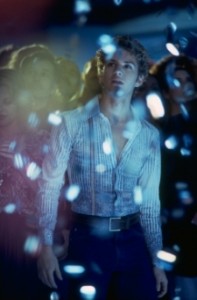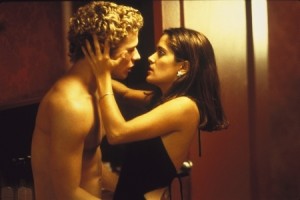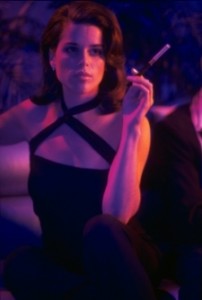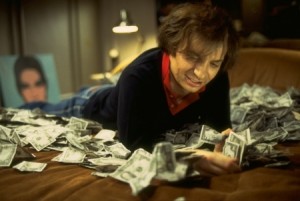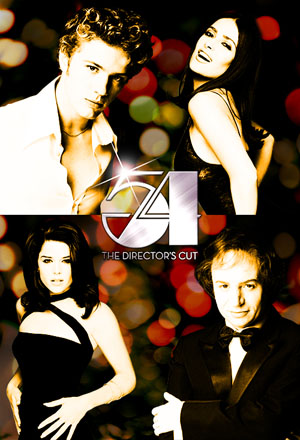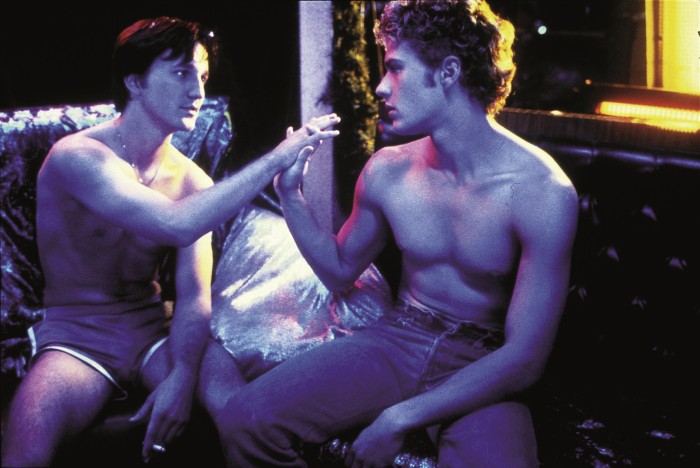
“54: The Director’s Cut” – Interview with Mark Christopher
by Sara Michelle Fetters - May 29th, 2015 - Film Festivals Interviews
a SIFF 2015 interview
Film critics, snobs and know-it-all cineastes are more than likely familiar with the saga of writer/director Mark Christopher and his 1998 opus 54. A drama inspired by the titular New York nightclub, loosely mixing fact and fiction as it told the story of the rise and fall of a teenage bartender who came of age in the venue just about as everything was on the verge of falling apart, the movie was buzzed to be something special, a potential Oscar-frontrunner with a revolutionary performance from Austin Powers and Wayne’s World comedian Mike Myers.
And none of it came to pass. The Miramax release was the victim of over 40 minutes of reshoots and re-edits, Harvey Weinstein, producing alongside his brother Bob, insisting Christopher make a number of changes before the film’s late August release. Instead of a hard-edged morality tale of youth in revolt, the story was shifted to become more of a standard, soapy love triangle, the studio demanding starlet Neve Campbell – currently hot thanks to her role in the Scream films – become a much larger presence than the filmmaker had initially intended.
For 17 years Christopher fought to have his original version restored. Considering the film, while a massive critical and commercial failure, had somehow managed to amass a rather large cult, primarily LGBT following, he always knew the possibility for this to happen was there, even if the passage of time callously and coldly worked against him. But when Disney finally parted with Miramax and a new regime free from both the Mouse House and the Weinstein brothers yoke took control, Christopher took it as a sign his day had finally come, calculating that they’d grant him back access to 54 allowing him to return things back to how they should have been once upon a time.
The new film is a revelation. Campbell’s soap opera ingénue Julie Black is an ethereal background character as she always should have been, while the real love triangle ends up concerning star struck New Jersey teen Shane O’Shea (Ryan Phillippe) and Studio 54 newlyweds Greg Randazzo (Breckin Meyer) and his fiery wife Anita (Salma Hayek). Club owner Steve Rubell (Myers, in an electrifying performance) is an even more ferocious yet pitiable presence, while the grounded tragic realism central to O’Shea’s rise and fall feels far more authentic and much less melodramatic than it did in the original release version. All-in-all, it’s a completely different motion picture, and one definitely worth seeing.
54: The Director’s Cut made its Seattle premier during a star-studded gala screening as part of this year’s Seattle International Film Festival. It was followed up by a Studio 54-themed party at a venue near the University of Washington, writer/director Mark Christopher, along with a secretive list of celebrities, attending. Additionally, the film is receiving an HD Digital release on June 2, 2015.
I had the opportunity to speak briefly with the filmmaker via phone before his Seattle arrival. Here are some of the highlights from that conversation.
Sara Michelle Fetters: So, starting off, I should admit, while I’ve watched 54 a number times, mostly thanks to friends who are for some reason or another obsessed with it, personally I’m not that big a fan, having many of the issues with the film you’d probably suspect I would. I think it’s interesting, but not successful. A missed opportunity, if you will.
Mark Christopher: [laughing] At least your honest about it. You’d be surprised how many aren’t.
Sara Michelle Fetters: What I’m trying to say is, I’ve now watched the director’s cut of this film twice, mostly because I was so shocked just how much I liked it after getting done with it the first time around. I mean, and I’m not just saying this to be nice, it’s really, really good, borderline great. The differences between these two versions is night and day.
Mark Christopher: Excellent. That’s terrific. As you’ve seen the old cut so many times, then you’re one of those who can really spot all the differences, then. Thank you, so much.
Sara Michelle Fetters: I can’t be the only one saying this to you, though. I’d imagine my reaction isn’t unique.
Mark Christopher: People have been really complimentary, that is true. There have been some pretty big words being passed around that I will not repeat but all of them have made me feel terrific, that I made the right choice continuing to fight for this film and my original vision for it. I’m honestly quite thrilled with the reception.
Sara Michelle Fetters: I don’t want to focus on the past, and I know the story is fairly well known at this point, but I’d be remiss if we didn’t chat for a minute or two about what happened back in 1998. What was that like when you submitted your completed cut of the film only to have Harvey Weinstein come back and say he wanted you to completely reprocess and rethink it, that he wanted you to change its very core to something you’d never initially intended?
Mark Christopher: Well, it didn’t happen quite that fast. It was sort of a process. The story is out there already, like you say, and for those that don’t know about it the whole long tale is easy to find if you want to go through the effort of doing so. But, to keep it short and sweet, it was obviously a pretty painful experience. But, then, I’m not the first writer/director to have this sort of thing happen. I’m certainly not the last writer/director who will have this happen. I just happen to be the luckiest writer/director in the world in that I finally have been given the opportunity to have my version of my movie out there. That’s my favorite part of the story, no question.
Sara Michelle Fetters: Why keep fighting?
Mark Christopher: Honestly, it was exactly how you opened our conversation that allowed this to happen. Critical reception notwithstanding, the cut of the film that came out has so many passionate fans and they’ve really kept [54] alive. It touched them and they’ve been very vocal about that.
For my part, I knew there was still a very strong movie there waiting to be shown. A movie with a good, clear story, great performances and solid themes, a movie that would be much truer to that world. I don’t know. I was raised on a farm and I was always told to finish the job. This, to me, was worth fighting for, if not just to finish the job but for the fans who have kept the film alive for the past 17 years.
Sara Michelle Fetters: How difficult was it to bring this cut of the film together?
Mark Christopher: In many ways it was much more difficult to make this cut than it was to compose the original version. The original release, I was a first time filmmaker working for a studio trying to handle a large cast of principals, including a few bona fide movie stars, as well as hundreds of extras trying to recreate a time and place that didn’t exist anymore. I mean, we built the actual nightclub up in Toronto. A more or less full-scale replica. Handling all of that was easier than putting my cut of the film back together.
You see, when we reshot, all of the excised footage was taken away by the studio, potentially to be destroyed. We had to go back and physically find all that original material. After my wonderful producer Jonathan King got the go-ahead from Miramax then it was up to [us] to do all of that investigating to see if those original pieces of film still existed. We actually found a number of the edited footage in a warehouse in shrink-wrap marked to be destroyed and if we hadn’t gotten to it when we had that’s what would have happened. I knew then that putting together this director’s cut of the film was meant to be.
Even then, though, we couldn’t find all of the material. Years earlier we’d cobbled together on VHS what we called the “bootleg cut” of the film, and you’ll notice in the film there are a few grainy, underground shots that aren’t up to the same quality as the rest of the picture. They were found on video, mostly because I’m a packrat and I’d saved a lot of this stuff just in case this day might come, and we were able to insert these bits after some reprocessing into the finished film. It’s literally underground footage, and we sort of had to pick and choose which scenes this material would work best in. You’ll notice in the seedier, darker sequences this stuff fits in quite nicely, I think.
But it’s a completely different movie. It’s almost a full half different. There were over 30 minutes of reshoots and all of that had to be pulled out so about 44 minutes of original material could be put back in. It gives you almost a full half a film of new material. I mean, one of the reasons you hear so much now about Ryan Phillippe’s performance is because I was able to build it back to what I’d originally envisioned that character to be.
Sara Michelle Fetters: I’m glad you bring that up because, it seems to me, at least, that the two people who should be calling you up and cheering your every move are Ryan Phillippe and Breckin Meyer.
Mark Christopher: Thank you! I’m so glad people are finally getting a chance to see just how terrific they were, how great their performances are. They came to the director’s cut premier and there was a wonderful Q&A afterwards that they both were so pleased to participate in. I’m so happy for Breckin, in particular, because his character really is the heart of the movie, and when it was recut that was completely changed, all of that stuff involving his character was lost. So now he’s put back and is finally getting the recognition he deserves.
Ryan, too. He was 17 when we made this film, and his character is so richly complex, dark, the journey he goes on a hedonistic descent he maybe doesn’t recover from. I don’t think that’s the case in the theatrical cut. It’s just so wonderful to have both his character and Breckin’s back like I originally wanted them to be. It makes me happy, and I think it makes them happy, too.
Sara Michelle Fetters: It really does becomes this almost Conrad-like Heart of Darkness tale that isn’t there in the original version.
Mark Christopher: Yeah. Exactly. This is a dark tale in the end, which I guess makes the film a little ahead of its time in a way. I have this very flawed lead character who is an opportunist and isn’t particularly likeable. I have a lot of fellow very flawed characters surrounding him, urging him further and further into the darkness. And, for a big 1990s release, this just wasn’t something that was done.
Now, thanks to television, this seems to be changing. It’s virtually a requirement for a television drama these days that your lead is a flawed, complex character battling with crippling emotional demons. It’s par for the course. I guess I should say thank you to television. [laughs]
Sara Michelle Fetters: It hurts me in some ways to think that this director’s cut of the film was considered controversial or ahead of its time. That my generation, the ones who were the target audience in the 1990s for this film, wouldn’t want to watch a film with such complex themes, a film that lays out its ideas about sexuality and gender with such unadulterated clarity.
Mark Christopher: I agree with you. It was the studio’s decision, though. They didn’t see it that way. I’m not sure I’ll ever fully understand why that was.
Sara Michelle Fetters: Do you think, maybe, in some ways, at least, your film was maybe a precursor to the Magic Mikes of the world, that it was an influence on modern LGBT and queer cinema?
Mark Christopher: I love Magic Mike. That movie is just terrific, isn’t it? But I see what you’re saying. And it does cover a lot of the same ground that my film does. Granted, I’m not Steven Soderbergh. My guess is that he gets plenty of freedom to deliver the cut he wants to.
But, if this cut had come out when it did it would have had to have been handled very differently than it was, very carefully, especially for the late 1990s. It would have had to have been platformed very slowly, not gone out as a big, massive wide release. And that wasn’t what Miramax wanted. They wanted a big A-train production, a 1,800 theater release, so that’s why you ended up with the studio cut.
Sara Michelle Fetters: Why do people not give Mike Myers more credit as an actor?
Mark Christopher: They certainly do for this movie, I’m happy to say. We had a wonderful time working on this. It was Mike’s reps who came to us. We were out pitching Steve Rubell to everyone and we and Miramax were having a hard time agreeing on an actor, and fortunately Mike showed up and wanted the part. He loved the script. He loved the character. We worked every day for three weeks to get him right, to build that character. It was funny, Mike told me that first day that I’d be shocked by how badly he’d start but to believe him when he said he would be there for me in the end. That the performance would be all we wanted it to be. He was so right. I really think he nailed it.
Sara Michelle Fetters: I know we don’t like to engage in hypotheticals but I do have to wonder what might have happened had this cut of the film been released. Would Myers have gotten that buzzed about Supporting Actor Oscar nomination that year? Could he have pushed James Coburn, Geoffrey Rush, Billy Bob Thornton, Ed Harris or Robert Duvall out of the race?
Mark Christopher: I was told by the head of the New York Film Critics Circle that they were going to nominate Mike that year, this critic had seen my original cut and he and some of his fellow members were buzzing in a big way. When the studio cut of the film was released they pulled the nomination. So, do I think it would have been possible? Certainly. But, as you say, we don’t want to engage in hypotheticals and so we’ll never know.
Sara Michelle Fetters: How does this film play today? In the almost two decades since its original release a lot of the conversations have significantly changed. Sex. Gender. Gay marriage. Sexuality. Do you feel like you contributed to that conversation with the original cut and are adding to it now with this director’s cut?
Mark Christopher: For sure I think my short films did. All of my films have played in Seattle, by the way. Every one. I’m very grateful for that. My very first film, The Dead Boys Club, actually won a Golden Space Needle award.
But, back to your question. With 54, I find it interesting that the film really is crossing over in ways that I originally hoped it would. Mainstream audiences find something in it as do LGBT audiences. I love going to both mainstream and LGBT festivals and gauging the reactions. I mean, my main character is brazenly, unapologetically bisexual, and you don’t see a lot of characters like that in either so-called cinema or queer cinema. I think, in those terms, the reactions, how the film adds to those conversations, I find that interesting as well.
Sara Michelle Fetters: And the film is frankly sexual. It never apologizes for any of its characters sexual situations.
Mark Christopher: Correct. No apologies. Not for any of it. There’s that lurking shadow of what is to come in the ‘80s but there’s still no judgment in regards to anyone’s behavior as it pertains to sex, drugs and all the rest. That was very important to me.
Sara Michelle Fetters: I’m not sure how to ask this without sounding rude, but, I mean, it’s been 17 years. Are you ever going to make another feature? You’ve kind of become the Terrence Malick of new queer cinema.
Mark Christopher: [laughs] I’ve never thought of it like that. That’s a good one.
Let’s just say it’s in the works. I’m looking for the right script as we speak. I do have a couple of television deals I’m excited about. But, I’ve got to tell you, it’s been such a fantastic, singular experience putting together this director’s cut that I am very excited to make another feature. I do need to find the right script as I’d love to do one that I didn’t write. But, we’ll see. Hopefully it will happen sooner than later and, if not, maybe I’ll have to lock myself in a bunker and just write a script for a feature myself.
But, one thing’s for sure, I don’t give up. It’s going to happen.
Portions of this interview reprinted courtesy of the SGN in Seattle
